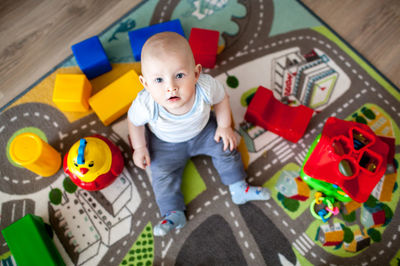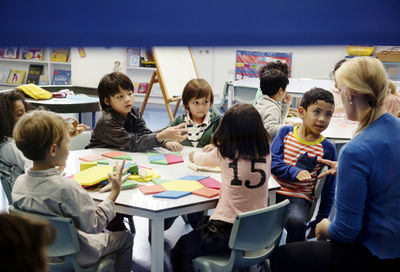Creative Teaching EFL in a Kindergarten

English has spread widely all over the world, first because of the influence of the British Empire and, second due to the pre-eminence of North American influence in the world. In Europe, English has advanced as an international language especially after World War II, leaving behind other preeminent languages such as French.
Table of Contents
Examples of such questions include:
Do you want to teach English abroad? Take a TEFL course today!
This post was written by our TEFL certification graduate Javier O. Please note that this blog post might not necessarily represent the beliefs or opinions of ITTT.
What makes lessons fun?
The key to making educative play fun and useful is to make sure that we engage students without frustrating them. Asking them repetitive questions or simply asking too many questions can be frustrating and counterproductive. We can ask about one question every minute or so.
Encourage students to answer in English, but don't force them to speak to one another in English. As things progress, they may speak to one another in English of their own accord. A child has a reduced attention span even in his or her language; teaching children English, therefore, must be done with attention to this fact. Children should generally not be asked to do an activity for any longer than 20 minutes.
So these activities work particularly well with beginners, as the child doesn't need to have an extensive English vocabulary to participate, but once you've integrated these methods into your teaching style, you may find yourself using them again and again, even with more advanced students.

Also Read: 5 Keys become a great EFL Kindergarten Teacher
1. Art Projects
Students can draw pictures independently, but we should walk around the room and encourage them to talk about their work. Art is a fantastic way to get your young students excited and interested in a variety of lessons to reinforce different vocabulary.
2. Active games
Great way to get beginners up and moving. Always sure to introduce words plan to use in lesson format before introducing the game. Students can always assume they understand what you're saying, particularly if they're following the rest of the group.
3. Singing Songs
Songs are a fantastic mnemonic device for new vocabulary, and the Internet is a wealth of different song ideas. The best time to use a song is once the vocabulary has already been introduced. Some songs are simpler, ideal for using the same day or the same week that the vocabulary is introduced:
- "7 Days A Week" — for learning the days of the week
- "If You're Happy" (simplified) — for learning emotions
- "Put on Your Shoes" — for learning clothing words
- "Rainbow Song" — for learning colors

Also Read: Do TEFL certificates expire?
4. Labeling
Labeling can be a great way to remember new vocabulary. Can be used in the classroom or with photographs, teaching the names of different things in the classroom, tasking your students with creating labels for them can be a great way to get them up and moving—and speaking!
5. Educative Play
Particularly when your students are very young, the educative play is a useful technique for teaching them without ever letting on! The idea with the educative play is for teachers and assistants to participate in the play in English, asking questions that students can answer.
Examples of such questions include:
- What are you doing?
- What are you playing?
- Can I play?
- What's that?

Also Read: Several Pronunciations Troubles Faced by The Japanese Native Speakers
Do you want to teach English abroad? Take a TEFL course today!
Walking into a kindergarten classroom in any language may have most of us running right back out the door. A kindergarten classroom can be like a circus. The teacher is the ringmaster. The students range from man-eating lions to trapeze artists to clowns. It's important to remember that kindergarten students do not understand they are meant to be learning great truths and skills that will set them up for the rest of their life. They want to play, love, beloved, and enjoy every aspect of life to the fullest, even when they are sitting in the classroom. Even the physical excitement that kindergarteners have can be used to create an even deeper understanding of language and should never be seen as bad. Children love to explore and learn.
Apply now & get certified to teach english abroad!
Speak with an ITTT advisor today to put together your personal plan for teaching English abroad!
Send us an email or call us toll-free at 1-800-490-0531 to speak with an ITTT advisor today.
Related Articles:
- TEFL Breakdown - What Subjects Will Your TEFL Course Cover?
- 5 Reasons Why Teaching English Abroad Enhances Your Career Prospects
- Top 5 Tips: How to Learn a New Language When Teaching English Abroad
- 4 Top Tips for Getting Your TEFL Certificate on the Road
- The How-To Guide for Americans to Teach English in Europe
- 5 Great Places to Teach English Abroad Without a Degree



